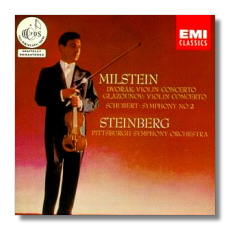
The Internet's Premier Classical Music Source
Related Links
- Latest Reviews
- More Reviews
-
By Composer
-
Collections
DVD & Blu-ray
Books
Concert Reviews
Articles/Interviews
Software
Audio
Search Amazon
Recommended Links
Site News
 CD Review
CD Review

- Antonín Dvořák: Violin Concerto, Op. 53 (1883)
- Alexander Glazunov: Violin Concerto, Op. 82 (1905)
- Franz Schubert: Symphony #2, D.125 (1814-15)
Nathan Milstein, violin
Pittsburgh Symphony Orchestra/William Steinberg
EMI 67250
All right, if asked to name the finest violinist of this century I would probably hesitate only a bit before suggesting Nathan Milstein. Time and again I find myself hearing more music in the music than I hear from other violinists. I prefer Milstein to Heifetz any day. Perlman, in contrast, seems like he is on automatic pilot most of the time. This disc offers me even more evidence for Milstein's case.
The Dvořák always seemed "second rate" to my ears until I listened to this recording. I find the piece more "Beethoveny" than "Brahmish". This is especially true of the first movement. The piece was composed between 1879 and 1882. Joachim, to whom Dvořák turned for advice on the solo part, played a "run through" in '82 but the two differed on several points and František Ondricek premièred the piece in 1883.
Anyway, what Milstein does here, as always, is "get inside" the music. Somehow Milstein's playing immerses itself into the role, much like a consummate actor does. Whenever I listen to Heifetz or Perlman I am aware of the musicians first and then the music. This is not the case with Milstein. This may be why this recording is the first to open my ears. Perhaps some comparisons are in order.
I also listened to a recent release by Pamela Frank with Charles Mackerras and the Czech Philharmonic. In addition, I put on Salvadore Accardo and Colin Davis on Philips. First of all, the Frank/Mackerras/Czech should have been much better than it was. The sound of the orchestra is too distant. This 1957 recording is as good as the one forty some years later. Second, I find Frank's interpretation too laid back. This may or may not have something to do with tempi; she takes almost two minutes more in the first movement than does Milstein. At any rate, I find myself getting bored. I will confess that her interpretation has some absolutely marvelous moments, but the overall impression is one of stasis. Then there is the Accardo/Davis recording on Philips. Accardo is another of my favorite, unsung violinists (sorry). Their interpretation is a bit too foursquare for my tastes. I often find Colin Davis too much a Kapellmeister and this is no exception. Milstein and Steinberg find more music, they "interpret" it more, and especially in the last two movements Milstein is more "romantic" in his playing, more Czech (whatever that means). I guess the best way I can think of to say it is that Milstein caresses the music, he plays as if he loves it. Steinberg and the Pittsburgh acquit themselves quite well, thank you, as good as the Concertgebouw for Accardo and Davis. Of course the orchestra had only recently been drilled to a Szell-like precision by Reiner and have that same sense of discipline but with more warmth from Steinberg.
As for the Glazunov, as Milstein himself put it, he played the piece under the direction of the composer. (I really like the fact that EMI included Milstein's comments about the music.) Glazunov is one of those composers who I always have felt their ability never was fulfilled due to resting on it. It isn't that Glazunov didn't work; he just quit before the music really cohered. (Cohered???) Just now I was listening to the slow movement as I watched snow swirl about outside. Mien Gott! What a sensual experience as the flute noodles around the swirling strings. On the other hand, the music doesn't hold my attention the way Dvořák's does, not to mention Brahms or Beethoven or Sibelius. Still, as I listen to Milstein in many ways I am hearing this music for the first time.
If I confess a perverse preference for Silvia Marcovici with Stokowski (if you can get it, on London "Phase Four" 455157) it is Perverse. Much slower, much darker than Milstein and Steinberg. The very opening solo has a more gypsy flavor to it. The flautist in the second movement is also darker, more with an almost reedy quality to the playing. As for more recent comparisons, I certainly prefer Milstein to the recent, critically hailed, Vengerov recording on Teldec. While Vengerov is very good, Milstein is the enemy of the very good.
And another thing, in 1953 how many recordings were there of Schubert's 2nd Symphony? I don't have a Schwann handy (was it more accurate then than now?) but my guess would be that this one might have been the only one. Howze it? Well, again there is the precision that lends a more "classical" touch to the music, Haydn comes to mind more than Beethoven, but then there's that flautist (is it the same person who caught my attention in the Glazunov?)!!! His or her playing, as the case may be, is just delicious and lends a romantic glow to events. Steinberg conducts a warm, almost affectionate performance. Whenever I listen to this conductor I am amazed that he didn't have a larger following. His performances all have more character than did Ormandy's. So it goes.
I recommend this disc sans qualifications. Enjoy.
Copyright © 2000, Robert Stumpf II



















